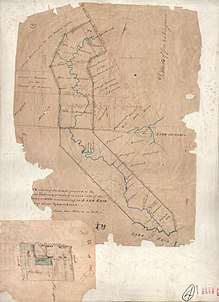Wellington District, Upper Canada
_-_Geographicus_-_WestCanada-tallis-1850.jpg)
The Wellington District was a historic district in Upper Canada which existed until 1849. It was formed in June 1840[1] from townships transferred from certain other districts:
| District | County | Townships | Other lands |
|---|---|---|---|
| Gore | Halton |
|
|
| Home | Simcoe |
|
|
| London | – |
- ↑ later surveyed to form the townships of Wellesley and Peel
- ↑ later surveyed to form the townships of Maryborough and Wallace
- ↑ being the Mississaugas
- ↑ acquired under the Saugeen Tract Agreement
- ↑ the sum of which was surveyed into townships on either side of the Garafraxa Road that was constructed in the period 1840-1848 to the new community of Sydenham

For electoral purposes, it was called Waterloo County and the district town was Guelph.[3]
Upon the passage of the Act of Union 1840, for electoral purposes Erin Township was attached to Halton County, which became known as the East Riding of Halton, and the remaining townships of Wellington that had previously been part of Halton became known as the West Riding of Halton.[4]
When the East and West Ridings were renamed for their respective counties in 1845, the township of Erin continued to be part of Halton for electoral purposes, and the township of Dumfries was similarly included for such purposes in Waterloo.[5] At that time, Waterloo County was declared to consist of the following townships:[5]
- Arthur
- Amaranth
- Bentinck
- Derby
- Eramosa
- Egremont
- Guelph
- Glenelg
- Garafraxa
- Holland
- Luther
- Mornington
- Minto
- Maryborough
- Melancthon
- Normanby
- Nichol
- Peel
- Proton
- Puslinch
- Sydenham
- Sullivan
- Waterloo
- Wilmot
- Woolwich
- Wellesley
In 1849, Wellington District was abolished, and Waterloo County remained for municipal and judicial purposes.[6] The territory of the Bruce Peninsula became part of Waterloo in 1849,[7] but was later withdrawn and transferred to Bruce County in 1851.[8]
References
- ↑ Armstrong, Frederick H. (1985). Handbook of Upper Canadian Chronology. Toronto: Dundurn Press. p. 195. ISBN 0-919670-92-X.
- ↑ An Act erecting certain parts of the Counties of Halton and Simcoe into a new District, by the name of the District of Wellington, S.U.C. 1837 (1st Session), c. 116 , implemented by Proclamation of June 18, 1840
- ↑ 1837 Act, s. 28
- ↑ An Act to re-unite the Provinces of Upper and Lower Canada, and for the Government of Canada, 3 & 4 Vic., c. 35, s. 13
- 1 2 An Act for better defining the limits of the Counties and Districts in Upper Canada, for erecting certain new Townships, for detaching Townships from some Counties and attaching them to others, and for other purposes relative to the division of Upper Canada into Townships, Counties and Districts, S.C. 8 Vic., c. 7, Sch. B
- ↑ An Act for abolishing the Territorial Division of Upper-Canada into Districts, and for providing for temporary Unions of Counties for Judicial and other purposes, and for the future dissolutions of such Unions, as the increase of wealth and population may require, S.C. 12 Vic., c. 78, Sch. C
- ↑ An Act to divide the District of Huron, in the Province of Canada, and for other purposes therein mentioned, S.Prov.C. 1849, c. 96
- ↑ An Act to make certain alterations in the Territorial Divisions of Upper Canada, S.Prov.C. 1851, c. 5, Sch. A, par. 29